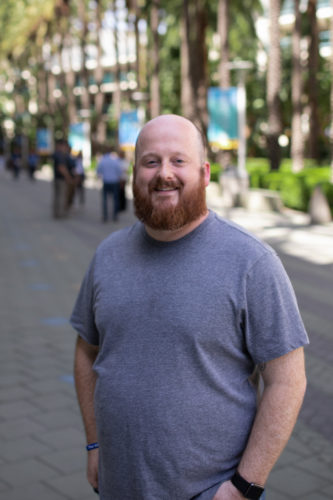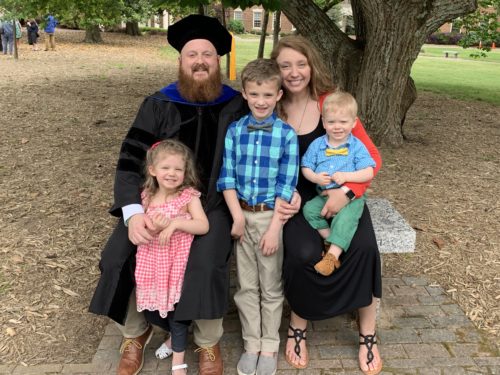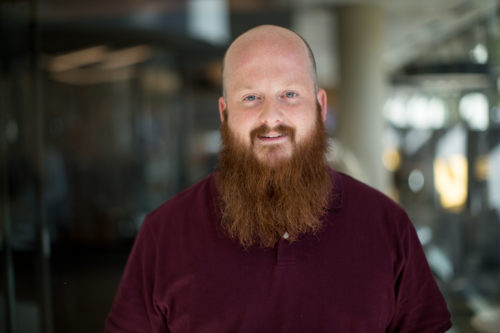Following Christ into Hard Places: The Road to Church Planting in Philadelphia
Chad Burchett | December 06, 2022

As a pastor’s son in southeastern Virginia, Mark Turner learned the gospel from a young age and grew up in the rhythms of church life. Although he was converted while a child, he battled a performance-based approach to Christianity through high school, culminating after graduation in a season of disenchantment with the church.
 “If it wasn’t for my parents who were genuinely godly, humble people, I probably would have been tempted to reject a lot of what I had grown up with,” recalled Turner. “But they are the real deal.”
“If it wasn’t for my parents who were genuinely godly, humble people, I probably would have been tempted to reject a lot of what I had grown up with,” recalled Turner. “But they are the real deal.”
When he left to major in History and Religious Studies at The College of William and Mary, Turner thought he could just love the Lord and move away from the church, whose drama and hypocrisy he had grown to despise. Through the faithful encouragement of his parents, a persistent youth pastor, and many other seemingly insignificant acts of God, Turner got connected with a small church plant in Williamsburg, Virginia.
Although the church plant lacked many features that he was accustomed to in well-established churches, what they did have was genuine, meaningful community in Christ. “There were a lot of new believers who loved the Lord and were genuinely interested in sharing the gospel,” Turner remembered. “That church plant rehabbed my vision of how the Church in authentic community can display the gospel.”
“I did not need a big show; I needed authentic, genuine community,” noted Turner. “Through that community, God convicted my heart about the role of church planting and reaching the lost and discipling those who are saved. So, I graduated from college and went to Southeastern with the goal of planting a church.”
In 2006 Turner enrolled in the Master of Divinity in Advanced Biblical Studies at SEBTS and graduated in 2009, having learned how to study the Bible more deeply for himself and how to communicate its teachings to others.
“Some people describe seminary as a hoop to jump through,” noted Turner, “but I found my time at Southeastern to be a life-giving, spiritually edifying experience. Southeastern encouraged in me an undeniable love for God’s word. No amount of effort is too great to understand it or communicate it to someone else.”
“Southeastern encouraged in me an undeniable love for God’s word. No amount of effort is too great to understand it or communicate it to someone else.”
Turner attributed his spiritual formation, in large part, to God’s kindness through his professors at SEBTS. “Steven McKinion, with his humor and breadth of knowledge, showed me how the lessons of the early Church relate to the Church today and how to think and read the Bible as a Christian,” Turner commented. “John Hammett — even though incredibly intelligent — was always humble, he undeniably loved the Lord, and he was always available to talk to me. Also, with David Black there was no denying that his heart was the Great Commission. It was powerful to see his intellect and his heart for the Great Commission come together.”
 After graduating in 2009, Turner accepted a family pastor position at a church in Suffolk, Virginia, having sensed God closing several doors to church planting during that season. As a freshly minted 25-year-old seminary student, Turner learned to embody his training in the context of this local church. “It was the place where God taught me how to be a pastor,” shared Turner. “It was the place where all those theoretical lessons got shaped.”
After graduating in 2009, Turner accepted a family pastor position at a church in Suffolk, Virginia, having sensed God closing several doors to church planting during that season. As a freshly minted 25-year-old seminary student, Turner learned to embody his training in the context of this local church. “It was the place where God taught me how to be a pastor,” shared Turner. “It was the place where all those theoretical lessons got shaped.”
Encouraged by his graduate studies at SEBTS, Turner began a PhD in Biblical Theology in 2010 and steadily worked on his program while pastoring full time. In the years to follow, God used Turner’s sustained connection with Southeastern to help his church in Suffolk recover from a season of conflict and upheaval.
“There was some conflict surrounding the leadership in the church,” Turner narrated. “The lead pastor left, and the church declined, revealing a lot of inadequacies of discipleship in the church. It was a tough time, and I did not know where to turn. So, I ended up at Southeastern in Chuck Lawless’s office with our elder board.”
“John Ewart ended up coming to be our interim pastor for more than a year,” Turner recalled. “By God’s grace and John’s hard work and honesty with our church, God rescued the church, and we came out of that season healthier than we had ever been before.”
From 2009 to 2018, the influence of SEBTS in Turner’s life and congregation was profound, eventually reinvigorating his desire to pursue church planting. “Southeastern ingrained in us that a healthy church is a sending church. As we were leading our people toward this reality, God relit the pilot light of church planting in my heart. The dream of church planting that I thought was closed was reopened, and I realized God had been preparing my wife and I over the last nine years of ministry.”
As Turner neared his graduation from the PhD program at SEBTS, his church began praying for and preparing Turner and his wife to plant a church. The church allowed Turner to stay on staff for two years while completing a church planting residency at The Summit Church in the Raleigh-Durham area, enabling him to raise money, develop vision, and recruit a launch team.
“That church, which Southeastern played no small part in helping to preserve, sent us in 2018 to plant a church in Philadelphia, Pennsylvania, in partnership with The Summit Church and the North American Mission Board,” Turner shared. “That 300-person church sent us with their prayers, a church planting team, and $80,000, which was such an amazing blessing. That is the beauty of everyday faithful servants of God.”
Although God fulfilled Turner’s desire to plant a church, the road has not been easy; however. God has blessed him with an abiding joy as he lives on mission. “Church planning in Philadelphia is particularly difficult,” commented Turner. “But we have found great joy in participating in the mission of God. We are most like Christ when we sacrifice for the mission and suffer with him.”
“We have found great joy in participating in the mission of God. We are most like Christ when we sacrifice for the mission and suffer with him.”
 “We are serving in West Philadelphia,” shared Turner. “There are many challenges in the community where we serve — challenges that were only heightened by the pandemic. Philadelphia had reversed a thirty-year trend of declining homicides to now having more homicides over the last two years than they have had in any of the past thirty years. Carjackings are at an all-time high. In Philadelphia, 40 percent of children are under the poverty line. With inflation, poverty levels have only been exacerbated in underserved communities.”
“We are serving in West Philadelphia,” shared Turner. “There are many challenges in the community where we serve — challenges that were only heightened by the pandemic. Philadelphia had reversed a thirty-year trend of declining homicides to now having more homicides over the last two years than they have had in any of the past thirty years. Carjackings are at an all-time high. In Philadelphia, 40 percent of children are under the poverty line. With inflation, poverty levels have only been exacerbated in underserved communities.”
Turner asks his SEBTS community to pray for the resolve and perseverance of his church even on days when the beauty of life on mission seems to fade, to pray for people to be saved, and to prayer for their discipleship and evangelism efforts among young men and single-parent homes affected by the pervasive violence in the area.
“Philadelphia is only 6 percent evangelical,” commented Turner. “It is very tough soil in desperate need of the gospel.”
As Turner lives on mission in one of the poorest large cities in America, what stands out to him about the influence of SEBTS on his life is its commitment to the Great Commission. “What I saw, exemplified both in the classroom and even just in the culture of Southeastern, is the non-negotiable nature of the Great Commission,” shared Turner. “Southeastern emphasized that all of us are called to go in some capacity, and that we are most like Christ when we go to hard places.”
“What I saw, exemplified both in the classroom and even just in the culture of Southeastern, is the non-negotiable nature of the Great Commission. Southeastern emphasized that all of us are called to go in some capacity, and that we are most like Christ when we go to hard places.”
Each semester Southeastern trains and mobilizes hundreds of students, like Turner, to do ministry in rural towns, urban centers, and hard-to-reach places all around the world. Check out Southeastern’s MDiv page to read more about our MDiv specializations and to learn how we can equip you to serve the Church and fulfill the Great Commission wherever God sends you.